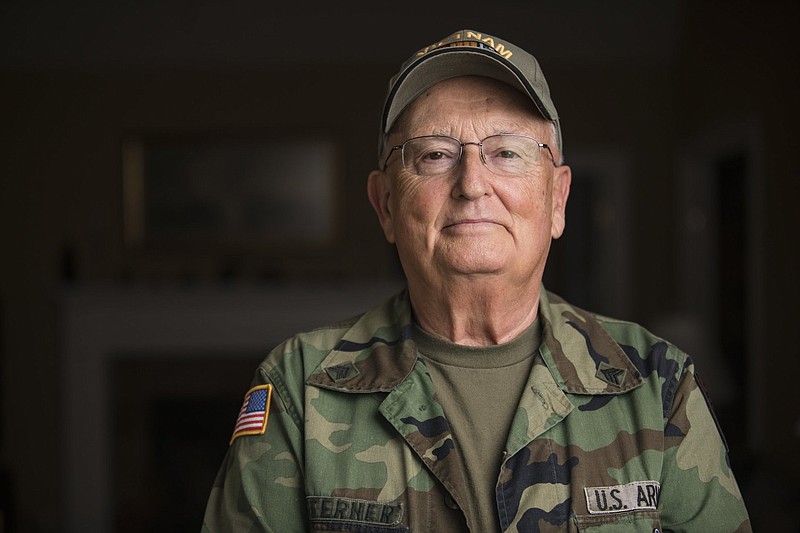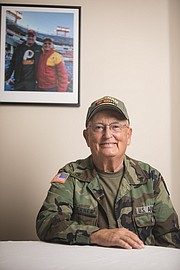Jerry Sterner was just 20 years old when he was drafted into the U.S. Army in 1967, right in the middle of the Vietnam War.
"I wasn't excited, to say the least," Sterner said. "You always have apprehension, especially back then, back in the '60s."
He was in college at the time, studying business administration in Wilmington, Delaware. That's when his mother called.
"'Jerry, you got a letter from the draft board,'" Sterner recalls her saying.
His older brother had already been deployed and returned, and his mother wanted her boys home. But, he said, "if Uncle Sam says I want you, it's time to go."
So he packed up his things and went back home to Pottsville, Pennsylvania, before hopping on a bus and ending up at Fort Dix, New Jersey, where he went through basic training.
His first tour of duty was in Japan, where he monitored the Russians from the northernmost island of Hokkaido.
"We monitored what was going and coming from Russia," he said. "There was always something that came up on the radar screen that would get us a little concerned."
Sterner's job, specifically, was to intercept and analyze Morse code and then send it to other analysts "who'd take that information and see if they can put it together and make some sense out of it, as far as number of troops, 'Was it a battalion?' Or, 'Was it a regiment? 'Where are they? Where are they moving from? Where they moving to?'"
If the analysts had a pretty good idea of where the enemy forces were, they'd call in the U.S. Air Force.
"We'd make sure there were no friendlies around - no allied forces, no American forces - and make sure it's all clear and then we'd say, 'This is the fix. If you hit that, you're bound to be successful in taking out either the enemy themselves or take out their supplies. Take their supplies, they're done. They're finished. No food, no ammunition."
He had the same job in Vietnam, and it was that work that earned him a Bronze Star Medal for meritorious achievement in ground operations against hostile forces.
"I'm not a hero by any stretch," he said. "I don't consider myself a hero. Basically, I just was called and I went. And I am proud to have had the privilege.
"I had a responsibility. And I took it very seriously. But one thing I've learned from that experience from being called into the commander's office and receiving that [medal] was that I must have led by example. And I didn't notice. I wasn't aware that anybody noticed."
When he arrived in Vietnam, it was the weather that greeted him first.
"It was hot," he said. "If you've ever been to Florida in [the summer], just take that times two or three. It's stifling and [has] mosquitoes about the size of small animals."
BIO
Name: Jerry SternerAge: 75 Branch of military: U.S. ArmyYears of service:1967-1971
(Read about other local veterans in our "21-Veteran Salute" series here)
From the time he got the letter from the draft board to landing in Vietnam, Sterner said he didn't really have time to think about what was happening.
"You're so young. You had a job to do," he said. "You can't prepare yourself mentally or emotionally and physically. You just, you know, you lean on your fellow comrades - guys that have been there before you."
He said the nights were the hardest.
"When you hear the machine gun fire, the rocket fire, the bombs It just - I didn't sleep very well for quite a long time," he said.
"It's pretty hair raising to hear it."
He doesn't remember much of what happened, he said. "I think the Lord kind of blessed me in removing a lot of what went on there."
But he remembers one night during which there was a big explosion not far from his base camp. A claymore mine had gone off.
"A water buffalo tripped it," he said. "That poor water buffalo didn't have a chance. But we thought the enemy was coming toward us, so we called an alert and were ready to fire away."
By 1971, Sterner was on his way home. But it wasn't a warm welcome back to U.S. soil.
"They - [people] - weren't friendly," he said. "They weren't clapping like they do now through the airports. [Now], whenever troops go through the airport, they stand up and clap. I would have loved to have seen that, but America was not prepared for that. There was just too much negative publicity."
"I never felt like I was appreciated other than my friends and family."
It was his loved ones who were his support system.
His sister-in-law introduced him to one of her friends - Martha - upon his return, and five months later, they were married. Next year will be their 50th anniversary.
The couple moved to Chattanooga about 10 years ago after their children graduated from college and decided to stay in the area.
Now, he says, whenever he sees another Vietnam veteran, they welcome each other home.
"We welcome each other home because we never got the welcome before," he said. "So we do it ourselves."
But the general public is much more appreciative today than 50 years ago, he says.
"I have young people - they come up to me and say, 'Thank you for your service.' Oh, that young person, 50 years ago, would I have loved that! But I'm getting it now," he said with a smile.
Contact Rosana Hughes at 423-757-6327, rhughes@timesfreepress.com or follow her on Twitter @HughesRosana.

